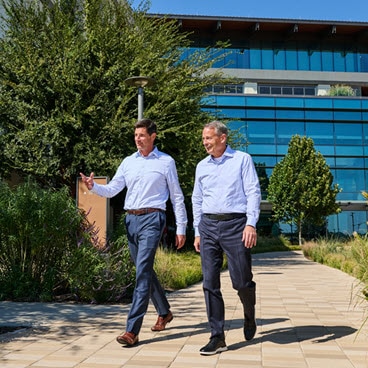
Bernie Clark, head of Schwab Advisor Services, set the tone for IMPACT 2021 when he looked into the camera at the 10K+ virtual viewers and stated, “The RIA Industry is unstoppable.”
Following one record-breaking decade after another, the RIA industry once again experienced a year of rapid growth.
Bernie congratulated advisors on their success and shared Schwab’s committed to seeing it continue.
“We’re invested in you because of you,” said Bernie. “We’re invested in your success and that’s something we always want you to be able to feel.”
Shaping the future
While there’s no denying the RIA model is outshining today’s competition, it’s still important to look ahead. What works for clients now may be completely different in the future—and advisors need to be ready.
Charles Schwab CEO Walt Bettinger reflected on the trends he believes will shape the future for Schwab and for the industry as a whole.
“Thinking about things further out always works well for us because we manage the firm for the long-term,” said Walt. “As we focus on building the future, a big part of that is the RIA industry.”
Keep reading for a recap of three RIA industry trends Bernie and Walt discussed at IMPACT 2021.
RIA industry trends to watch
1. The contours of relationships are changing, but they remain the definitive competitive advantage for RIAs.
The idea of relationships with clients being a competitive advantage could at first feel like last century’s news, but don’t discount this trend topic too quickly.
The COVID-19 pandemic changed our society—particularly the way we communicate with one another and how we define what matters most in life to us.
This cultural shift has naturally affected who we choose to interact with and why.
People have so many options for managing their finances. It’s the relationship itself that has the power to capture and keep the attention of clients and prospects, so they’re a strategic necessity.
- Bernie Clark, head of Schwab Advisor Services
Which is why according to Walt, advisors may need to rethink how they attract great talent to their firms.
“With the emergence of hybrid workplaces along with the continued blurred lines between personal and professional lives, people’s attention is being pulled in so many directions.”
Walt added that while clearly there are some shifts to competing for talent based on location flexibility, the client relationship factor will still pull the most weight.
“At the end of the day, I believe that companies like ours—with a purpose, and a business model fully aligned with the interests of its clients, and one that offers really meaningful work, that makes a difference in peoples’ lives—I think companies like that will have a leg up in the competition for talent.”
When it comes to strengthening their client relationships, advisors should ask themselves these questions:
-
With so many big issues surrounding clients (pandemic, economy, climate, etc.) what skills and resources do your teams need to be able to understand where clients are today, and help them navigate to the future?
-
How do you build and maintain true relationships inside the new norms of virtual and digital communications?
-
Does your talent strategy include a focus on diversity?
2. Personalized service is a growth engine for RIAs, one they already have.
These days customers (in nearly every industry) expect their wants and needs to be understood. This creates a wide-open highway of opportunity for RIAs because their value proposition has always been built on creating personalized experience for the individual client.
And when you pair the natural people skills RIAs have with the predicative analytics offered through technology, advisors will be able to increase the scale at which they offer customized solutions to clients.
“I’m sure our RIA clients see this all the time,” said Walt. “People still care a lot about the returns they generate, but many people are of the belief that you don’t have to have a tradeoff between returns and the opportunity to advance the causes that you think are important, and those you want your money to support.”
When thinking about how to approach personalization, ask these questions:
-
Are you considering opportunities for personalization across every facet of your business?
-
What questions are you regularly asking your clients, and when? How do you engage during discovery and then ensure you stay abreast of their values and their needs in real-time?
-
Are you using data to anticipate client needs? How is the data collected? How is it analyzed? Do you have, or will you consider having people dedicated to interpreting data and connecting it to your business strategy, and your clients’ experience?
3. A growing RIA community strengthens every firm.
Over the years independent advisors have built a diverse environment that continues to provide more and more collective benefits as it grows.
“As RIAs continue to compete for assets and grow their firms, there is so much leverage to be gained through the community and networks of the RIA industry,” said Bernie.
Walt agreed, adding that it’s a situation where the whole is greater than the sum of its parts.
“As firms grow, they typically become more internally focused—it’s natural,” shared Walt. “So deliberate engagement with external networks within the RIA community allows outside perspectives to inform long-term strategic planning.”
And the same applies to knowledge networks. Firms today have to keep pace with a myriad of changes: from client preferences to investment solutions to technology.
Luckily, the RIA community is a vibrant resource for knowledge sharing and advisors should continue to collaborate as much as possible.
When considering the sustainability of the industry and how to continue strengthening your firm, ask these questions:
-
How are you engaging with the broader RIA community, and the ecosystem? Is it a formalized process for your team? Could it be part of your strategic plan?
-
Do you see the RIA community as a source of talent, referrals and knowledge?
-
How do you contribute TO the community versus how you benefit FROM the community?


